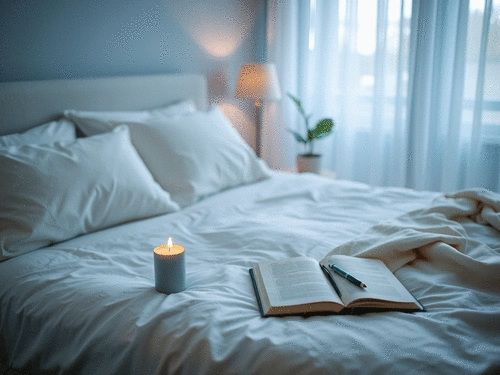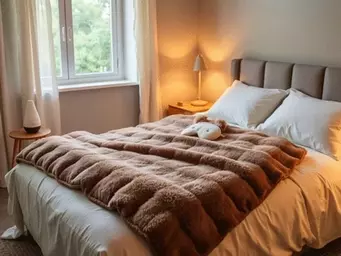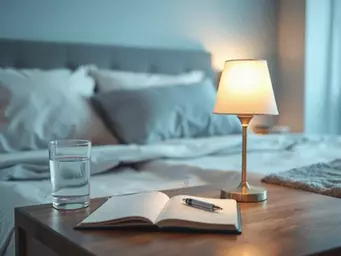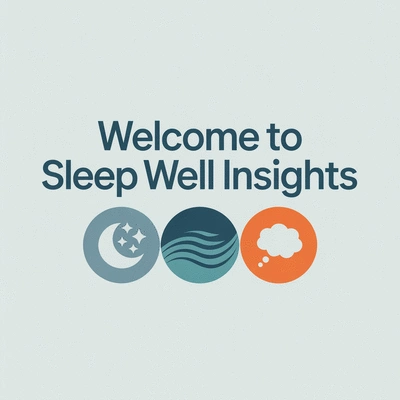Have you ever found yourself awake at night, your mind racing with worries that just won’t let you sleep? You’re not alone. Many people struggle with anxiety-induced insomnia, leading to restless nights and tired days. Understanding this condition is the first step toward regaining your restful nights.
What You Will Learn
- Anxiety-induced insomnia is sleeplessness caused by persistent anxiety, creating a cycle of restlessness.
- Common symptoms include difficulty falling asleep, frequent awakenings, and waking too early.
- Anxiety can lead to a reduced quality of sleep, affecting restorative phases crucial for recovery.
- Relaxation techniques, such as deep breathing and mindfulness, can significantly improve sleep quality.
- Incorporating practices like progressive muscle relaxation can help ease tension and promote peaceful sleep.
- Small, consistent changes to your bedtime routine can lead to profound improvements in sleep and overall well-being.
The Cycle of Anxiety-Induced Insomnia & Relaxation's Impact
This visual illustrates the cyclical nature of anxiety-induced insomnia and how targeted relaxation techniques can break this cycle, leading to improved sleep quality.
Anxiety & Insomnia Cycle
1. Anxiety: Triggers heightened alertness & racing thoughts.
2. Sleeplessness: Difficulty falling/staying asleep, frequent awakenings.
3. Exacerbation: Lack of sleep worsens anxiety, perpetuating the cycle.
Anxiety's Impact on Sleep Quality
- Increased Heart Rate: Makes settling down difficult.
- Heightened Brain Activity: Mind churns with thoughts.
- Fragmented Sleep: Frequent awakenings disrupt cycles.
- Reduced Deep Sleep: Less restorative rest.
Key Relaxation Techniques
- Progressive Muscle Relaxation: Release tension.
- Deep Breathing: Ground & reduce anxiety.
- Mindfulness Meditation: Present moment awareness.
- Yoga & Tai Chi: Release built-up stress.
Relaxation's Transformative Benefits
- Reduced Anxiety: Lessens tension & racing thoughts.
- Improved Sleep Quality: Enhances restorative phases.
- Enhanced Sleep Onset: Easier to fall asleep faster.
- Long-Term Improvements: Sustained better sleep patterns.
Understanding Anxiety-Induced Insomnia and Its Impact on Sleep
Have you ever found yourself lying awake, your mind racing with worries and what-ifs? This is a common experience for many, and it’s known as anxiety-induced insomnia. It’s when anxiety triggers sleeplessness, creating a frustrating cycle that can leave you feeling exhausted during the day. At Sleep Well Insights, we’re here to help you understand this condition and its effects on your overall sleep quality.
Anxiety can take many forms, whether it's about work stress, personal relationships, or health concerns. These feelings can manifest in our sleep, leading to difficulty falling asleep or staying asleep. The connection between anxiety and insomnia is essential to grasp for anyone seeking restful nights.
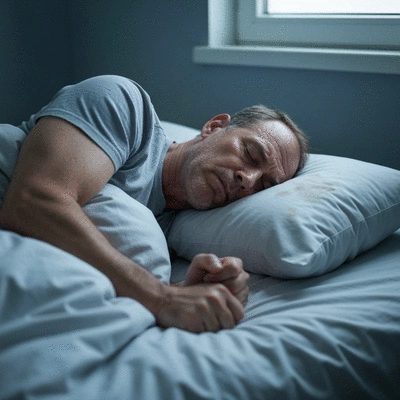
What is Anxiety-Induced Insomnia?
Simply put, anxiety-induced insomnia refers to the sleeplessness that arises from persistent anxiety. When you experience anxiety, your body is in a heightened state of alertness, making it challenging to relax enough to drift off to sleep. This can lead to a vicious cycle where lack of sleep exacerbates anxiety, creating a challenging situation to navigate.
- Symptoms: Difficulty falling asleep, frequent awakenings, and waking too early.
- Causes: Stressful life events, chronic health issues, or even daily pressures.
- Long-term effects: Impaired cognitive functions, mood disorders, and overall health decline.
Understanding these symptoms and their causes is the first step towards finding effective solutions. It’s vital to recognize that you’re not alone in this struggle, and there are ways to break the cycle of anxiety and insomnia.
How Anxiety Affects Sleep Quality
Anxiety can severely impact the quality of your sleep, leading to not just a lack of rest but also a reduction in the restorative phases of sleep. This means you might spend less time in deep sleep, which is crucial for physical and mental recovery. The stress response can keep your body in a state of alertness that makes it difficult to relax.
- Increased heart rate: Often, anxiety leads to physical symptoms like a racing heart, which can make it hard to settle down.
- Heightened brain activity: Your mind might churn with thoughts, making it difficult to transition into sleep.
- Sleep disruptions: Anxiety can result in frequent awakenings, leading to a fragmented sleep cycle.
By understanding how anxiety affects your sleep quality, you can take proactive steps to address these challenges. Implementing relaxation techniques can help calm your mind and prepare your body for a restful night.
We Want to Hear From You!
How do you currently manage your anxiety and sleep? Share your thoughts below:
Summarizing the Impact of Relaxation on Anxiety-Induced Insomnia
As we’ve explored, relaxation techniques can be a game changer for anyone struggling with anxiety-induced insomnia. They not only help to alleviate anxiety but also promote a sense of calm that is crucial for falling asleep peacefully. Imagine drifting off to sleep without the weight of your worries pressing down on you. What a relief that would be!
Integrating these methods into your nightly routine can transform your sleep experience. Here are some powerful ways that relaxation techniques impact your sleep:
- Reduced Anxiety: Regular practice can lessen the tension and racing thoughts that keep you awake.
- Improved Sleep Quality: Techniques like mindfulness and deep breathing enhance the overall quality of your sleep.
- Enhanced Sleep Onset: You may find it easier to fall asleep faster by incorporating relaxation into your pre-sleep routine.
- Long-Term Benefits: A consistent relaxation practice can lead to sustained improvements in your sleep patterns.
Feeling overwhelmed by anxiety doesn't have to dictate your nights. By implementing these techniques, you can reclaim your peaceful sleep, leading to better days filled with energy and focus.
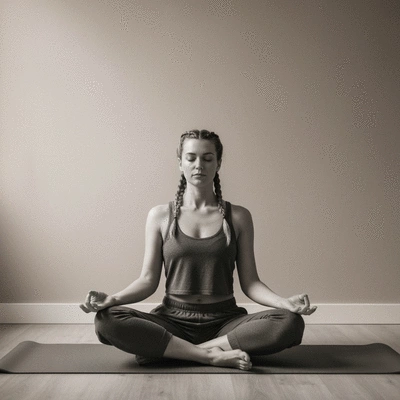
How These Techniques Can Transform Your Sleep Routine
Take a moment to think about your current sleep routine. Are you often tossing and turning or unable to clear your mind before bed? This is where relaxation techniques come into play! They can act as a bridge to a more serene and restorative sleep. For instance, practicing progressive muscle relaxation before bed can help your body let go of tension, preparing it for rest.
Incorporating methods like guided imagery or deep breathing exercises can also make a significant difference. Here’s a quick recap of techniques that can help:
- Progressive Muscle Relaxation: Systematically tense and relax different muscle groups.
- Deep Breathing: Focus on your breath to ground yourself and reduce anxiety.
- Mindfulness Meditation: Cultivate awareness and acceptance of the present moment.
- Yoga and Tai Chi: Gentle movements and postures can help release built-up stress.
Each of these techniques can be tailored to fit your lifestyle and preferences, making it easier than ever to find what works best for you. As I often say at Sleep Well Insights, every small change can lead to profound improvements in your well-being!
FAQs about Anxiety-Induced Insomnia and Relaxation
- Q: What is anxiety-induced insomnia?
- A: Anxiety-induced insomnia is sleeplessness caused by persistent anxiety, where the body's heightened state of alertness makes it difficult to fall asleep or stay asleep.
- Q: How does anxiety affect sleep quality?
- A: Anxiety can lead to increased heart rate, heightened brain activity, and fragmented sleep, reducing the time spent in restorative deep sleep phases.
- Q: What are some common relaxation techniques for improving sleep?
- A: Effective techniques include progressive muscle relaxation, deep breathing exercises, mindfulness meditation, yoga, and Tai Chi.
- Q: How quickly can relaxation techniques improve my sleep?
- A: While individual results vary, consistent practice of relaxation techniques can lead to noticeable improvements in sleep onset and quality over time, sometimes within a few weeks.
- Q: When should I seek professional help for anxiety-induced insomnia?
- A: If anxiety continues to disrupt your sleep despite consistent efforts with relaxation techniques, or if it significantly impacts your daily life, consider consulting a therapist specializing in cognitive-behavioral therapy (CBT) or a sleep health professional.
Encouragement to Begin Your Relaxation Practice Today
Ready to take charge of your sleep? Starting your relaxation practice doesn’t have to be daunting. Begin with just a few minutes a day—perhaps right before bed. With patience and consistency, you'll likely see the benefits over time. Remember, even the smallest steps toward relaxation can lead to the peaceful sleep you deserve.
If you find it challenging to start on your own, explore resources available at Sleep Well Insights or consider connecting with a professional who specializes in sleep health. The journey to better sleep is personal and unique; don’t hesitate to seek support!
Next Steps: Exploring Further Resources and Support
Recommended Readings and Tools for Managing Anxiety
To deepen your understanding and practice, I recommend diving into several valuable resources. Here are some of my favorites:
- The Relaxation and Stress Reduction Workbook: A practical guide filled with effective techniques.
- Mindfulness for Beginners by Jon Kabat-Zinn: A great introduction to mindfulness practices.
- Yoga for Anxiety by Amy Weintraub: A useful book that links yoga to anxiety relief.
- Apps like Headspace or Calm: These can guide you through relaxation exercises.
Each resource provides insights and techniques to help you manage anxiety and improve your sleep quality.
Connecting with Professionals for Tailored Guidance
If you find that anxiety continues to disrupt your sleep, consider reaching out to a professional. Therapists who specialize in cognitive-behavioral therapy (CBT) can offer personalized strategies to address your unique challenges. At Sleep Well Insights, we believe that everyone deserves tailored support on their journey to better sleep.
Don’t hesitate to seek help! Sometimes, having an expert in your corner can make all the difference in reclaiming your restful nights.
Recap of Key Points
Here is a quick recap of the important points discussed in the article:
- Understanding Anxiety-Induced Insomnia: Anxiety can lead to sleeplessness, creating a cycle that affects overall sleep quality.
- How Anxiety Affects Sleep: Physical symptoms like increased heart rate and heightened brain activity disrupt sleep cycles.
- Benefits of Relaxation Techniques: Techniques like deep breathing and mindfulness can reduce anxiety, improve sleep quality, and enhance sleep onset.
- Transforming Sleep Routines: Incorporating relaxation methods into your nightly routine can significantly improve your ability to fall asleep peacefully.
- Professional Support: If anxiety persists, seeking professional help can provide tailored strategies for better sleep.

